Emergency HVAC Kingsbury
Top Emergency HVAC Service in Kingsbury
Receive multiple After Hours HVAC quotes for your project today! Compare profiles, reviews, accreditations, portfolio, etc... and choose the best offer.

Mark Heat Recovery Systems
48 reviewsMark Heat Recovery Systems, Warwick, Warwickshire, CV34 6WD, GBMark Heat Recovery Systems is a company that offers high efficient Heat Recovery Systems to ensure a comfortable and healthy living environment for homes. They provide great service from start to finish, from sale to aftercare service. With high levels of expertise within the company, Mark Heat Recovery Systems is all you need to know to ensure a comfortable and healthy living environment for your home.
- Services
- Why Us?
- Accreditations
- Gallery
Get Quote
Premium Heating Plumbing & Cooling
4.533 reviews17 Stoneleigh Close, Coventry, CV8 3DE, GBWelcome to Premium Heating, Plumbing & Cooling, home to a team of experienced, expert Plumbing, Heating and Air Conditioning specialists based in Coventry, covering the West Midlands and on hand when you need us most. We keep your home or premises functioning efficiently and dependably. We pride ourselves on the vast range of professional level skills our team possess from central heating installation, boiler replacement and bathroom installation, meaning no matter the severity of the issue, or the nature of the problem, we can help.
- Services
- Why Us?
- Accreditations
- Gallery
Get Quote
Warwickshire Heating Ltd
Upper Farm Meadow, Warwickshire, CV35 0HJ, GBWarwickshire Heating provides unrivalled excellence in gas central heating installations, service, repair and installation of amazing new bathrooms for customers throughout Warwickshire, the Midlands and Oxfordshire. We have a strong reputation for providing high quality heating and bathroom solutions which is underpinned by our dedication to outstanding customer service. Our operating ethos is simple, to put our Customers First. We provide the highest level of personal service and priority to our customers. We strive to provide premium bathrooms with careful consideration to aesthetics, functionality & longevity. With a wide selection of products & materials to choose from, we take great pleasure in creating a bathroom solution that is unique to you and your lifestyle, that will last you for years to come. With our Gas Safe registered engineers, you can rest assured that your home is in safe hands with Warwickshire Heating and that your problem will always be dealt with safely and efficiently.
- Services
- Why Us?
- Accreditations
- Testimonials
- Gallery
Get Quote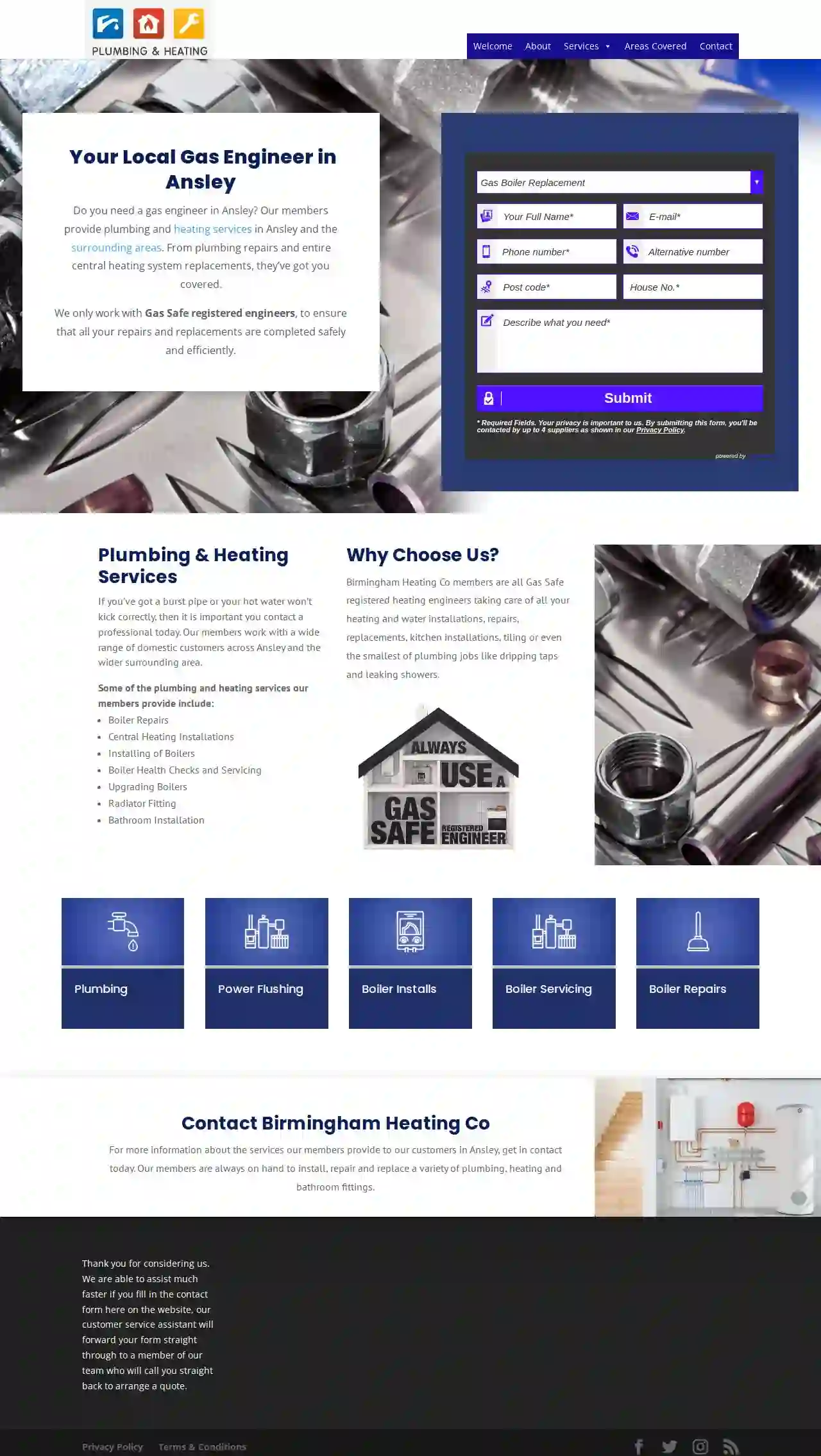
A R Gas Services Ltd
2.33 reviewsUnit 1, 100-102 Stratford Road, Birmingham, B15 1AA, GBBirmingham Heating Co is a network of Gas Safe registered heating engineers serving Birmingham and the surrounding areas. They offer a comprehensive range of plumbing and heating services, from small repairs like dripping taps to large installations like central heating systems. Their team of experienced engineers ensures all work is completed safely and efficiently. Whether you need a boiler repair, installation, servicing, or any other plumbing or heating assistance, Birmingham Heating Co is your go-to solution.
- Services
- Why Us?
- Gallery
Get Quote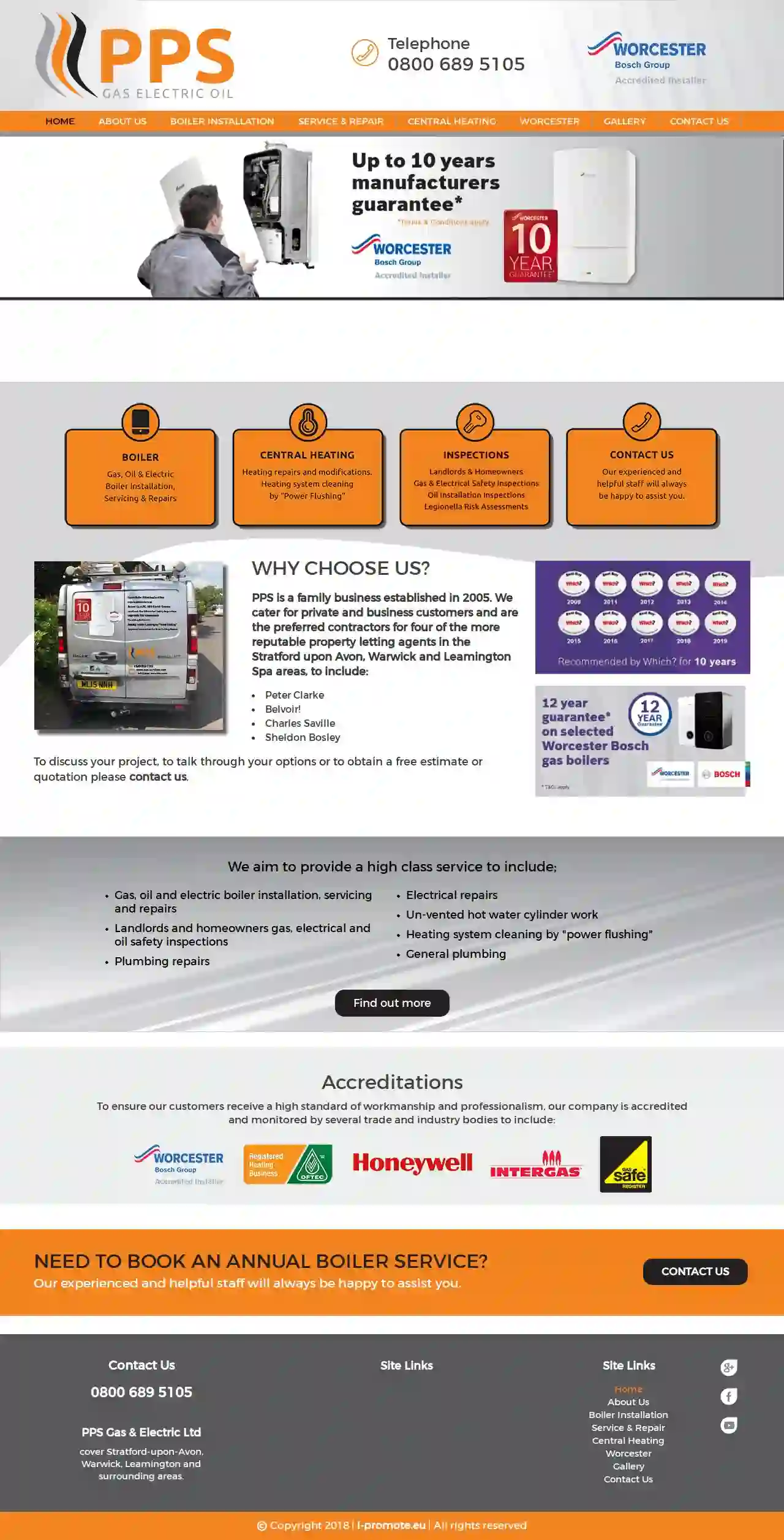
PPS Gas & Electric (Plumbing and Heating)
58 reviewsStratford-upon-Avon, Stratford-upon-Avon, Warwick, Leamington, and surrounding areas, GBPPS Gas & Electric Ltd is a family business established in 2005, catering for private and business customers. We are the preferred contractors for four of the more reputable property letting agents in the Stratford upon Avon, Warwick and Leamington Spa areas. We aim to provide a high-class service, including gas, oil and electric boiler installation, servicing and repairs, landlords and homeowners gas, electrical and oil safety inspections, plumbing repairs, electrical repairs, un-vented hot water cylinder work, heating system cleaning by 'power flushing', and general plumbing. We cover Stratford-upon-Avon, Warwick, Leamington, and surrounding areas.
- Services
- Why Us?
- Accreditations
- Gallery
Get Quote
Intergas Solutions
Chandos Business Centre, 87 Warwick Street, Chandos Business Centre 87 Warwick Street, Leamington Spa, CV32 4RJ, GBInter Gas Solutions is a family-run business with over 25 years of experience in the plumbing and heating industry. We are Gas Safe registered and fully insured, providing a reliable and trustworthy service to our customers. We pride ourselves on our commitment to quality workmanship, competitive pricing, and excellent customer service. Our team of skilled and certified plumbers are available 24/7 to handle all your plumbing and heating needs, from emergency repairs to full installations. We cover a wide range of areas in Coventry & Warwickshire, including Banbury, Bedworth, Coventry, Hatton, Henley In Arden, Kineton, Kenilworth, Leamington Spa, Nuneaton, Rugby, Southam, Stratford Upon Avon, Warwick, Wellesbourne, and Whitnash.
- Services
- Why Us?
- Accreditations
- Gallery
Get Quote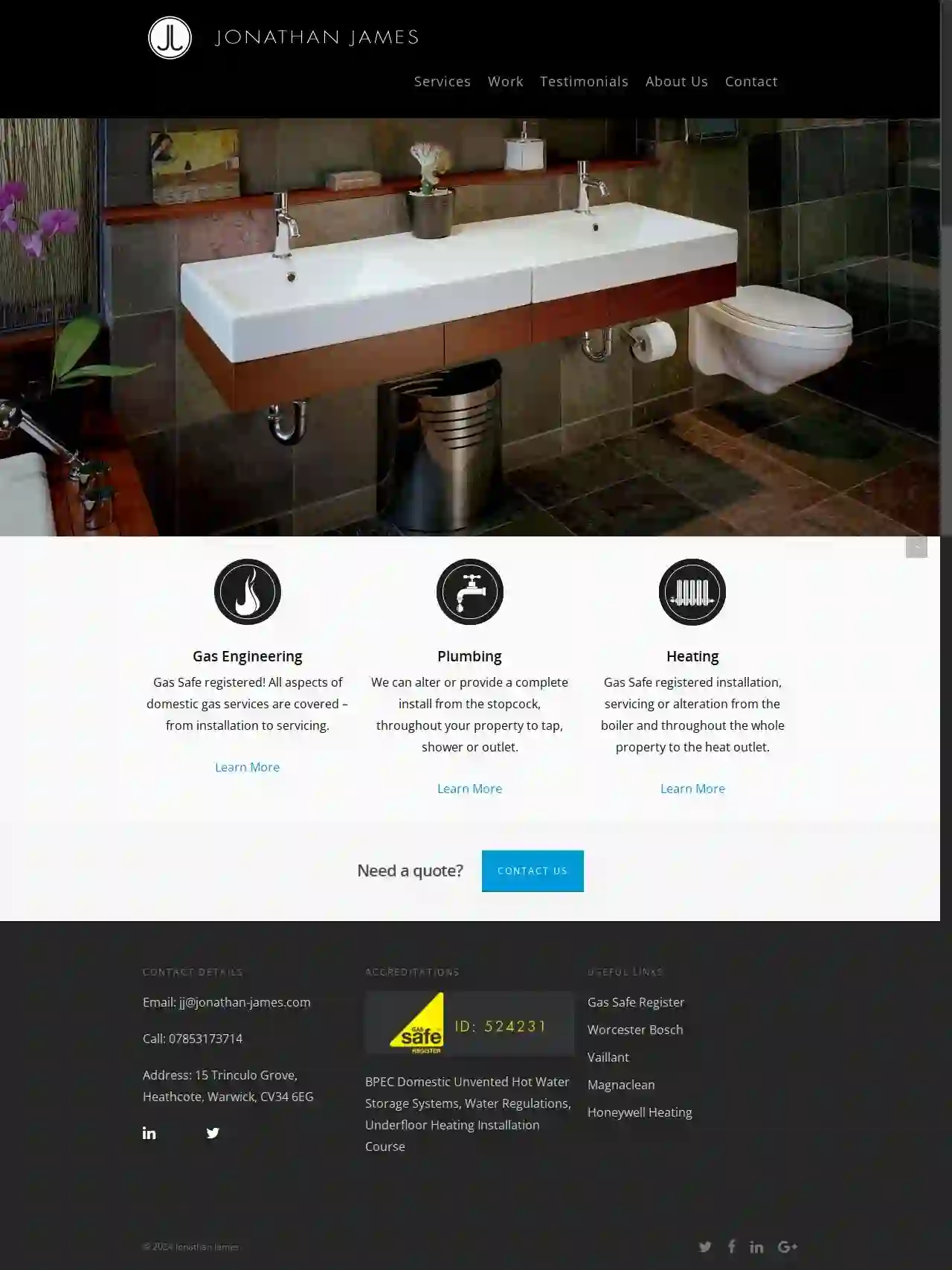
Jonathan James Ltd
51 reviewsHeathcote, 15 Trinculo Grove, Warwick, CV34 6EG, GBJonathan James Heating + Plumbing excellence throughout the Midlands. We provide a range of services including gas engineering, plumbing, and heating. Our team of experts are Gas Safe registered and have years of experience in the industry. We pride ourselves on our attention to detail and commitment to providing excellent customer service.
- Services
- Why Us?
- Accreditations
- Gallery
Get Quote
Power Flush UK
4.913 reviewsNuneaton, GBPowerFlushUK is a company that specializes in power flushing and de-scaling for homes and commercial properties. With over 4000 successful powerflushes under their belt, they have built a reputation for providing a thorough and effective service. Their team of experienced engineers will inspect your system, remove any rust and debris, and provide a certificate guaranteeing the cleanliness of your system. They also offer a five-year guarantee against blockages and a competitive package price starting from £380 for a typical 3-bedroom house.
- Services
- Why Us?
- Our Team
- Gallery
Get Quote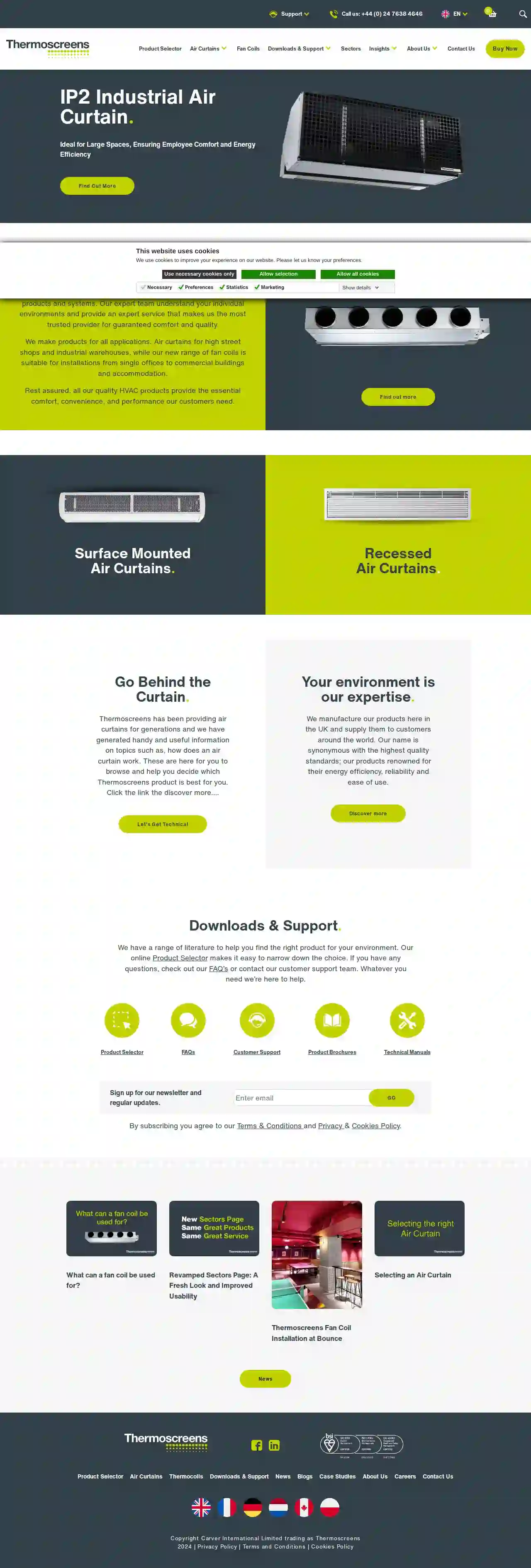
Thermoscreens
4.611 reviewsNuneaton, GBThermoscreens is a leading manufacturer of HVAC products, specializing in air curtains and fan coils. With a rich history of providing high-quality solutions, Thermoscreens has established itself as a trusted provider for both commercial and industrial applications. Their expert team understands the unique needs of each environment and offers tailored solutions to ensure optimal comfort, convenience, and performance. Thermoscreens' products are renowned for their energy efficiency, reliability, and ease of use. They manufacture their products in the UK and supply them to customers worldwide, upholding the highest quality standards. Thermoscreens is committed to providing comprehensive support to its customers, offering a range of resources including product selectors, FAQs, technical manuals, and a dedicated customer support team.
- Services
- Why Us?
- Gallery
Get Quote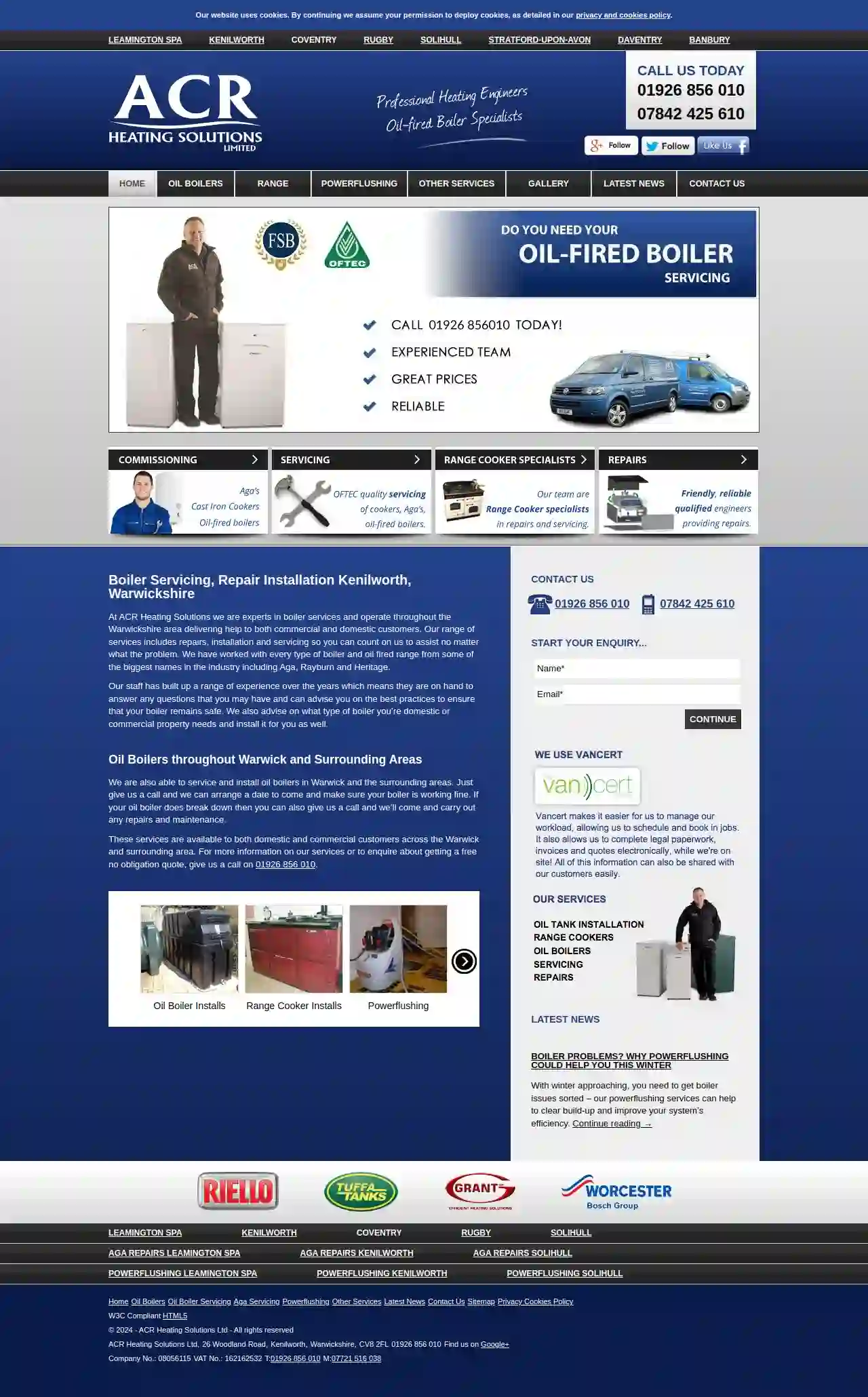
A C R Heating Services
3.58 reviews26 Woodland Road, Kenilworth, CV8 2FL, GBAt ACR Heating Solutions we are experts in boiler services and operate throughout the Warwickshire area delivering help to both commercial and domestic customers. Our range of services includes repairs, installation and servicing so you can count on us to assist no matter what the problem. We have worked with every type of boiler and oil fired range from some of the biggest names in the industry including Aga, Rayburn and Heritage. Our staff has built up a range of experience over the years which means they are on hand to answer any questions that you may have and can advise you on the best practices to ensure that your boiler remains safe. We also advise on what type of boiler you’re domestic or commercial property needs and install it for you as well. We are also able to service and install oil boilers in Warwick and the surrounding areas. Just give us a call and we can arrange a date to come and make sure your boiler is working fine. If your oil boiler does break down then you can also give us a call and we’ll come and carry out any repairs and maintenance. These services are available to both domestic and commercial customers across the Warwick and surrounding area. For more information on our services or to enquire about getting a free no obligation quote, give us a call on 01926 856 010.
- Services
- Why Us?
- Accreditations
- Gallery
Get Quote
Over 12,692+ HVAC Businesses on our platform
Our HVAC experts operate in Kingsbury & surroundings!
HVACCompaniesHub has curated and vetted Top HVAC Contractors near Kingsbury. Find a reliable pro today.
Frequently Asked Questions About Emergency HVAC Services
- Improve Energy Efficiency
- Extend System Lifespan
- Prevent Costly Repairs
- Enhance Indoor Air Quality
- Identify Potential Problems Early
- Ensure Safe and Reliable Operation
How often should I replace my AC unit?
What is a zoning system, and do I need one?
What is carbon monoxide, and how can it affect my HVAC system?
What are the benefits of a preventative HVAC maintenance plan?
How often should I replace my AC unit?
What is a zoning system, and do I need one?
What is carbon monoxide, and how can it affect my HVAC system?
What are the benefits of a preventative HVAC maintenance plan?
- Improve Energy Efficiency
- Extend System Lifespan
- Prevent Costly Repairs
- Enhance Indoor Air Quality
- Identify Potential Problems Early
- Ensure System Reliability